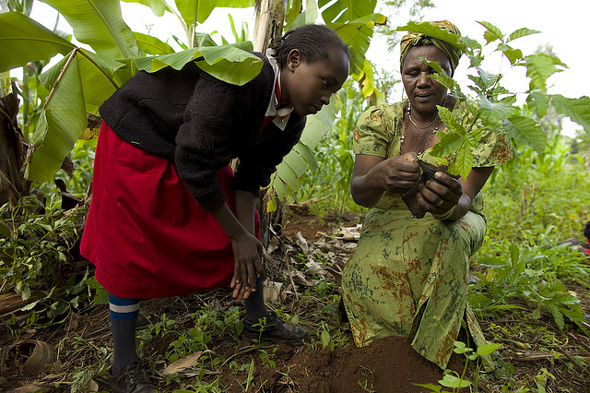-
Beyond Carbon Credits: TIST Combines Reforestation, Health, and Livelihood Efforts
December 17, 2012 By Carolyn Lamere
Carbon offsets have fallen in and out of favor since they were established with the Kyoto Protocol in 1997. Critics say they allow wealthy organizations to placate consumers and claim their products are “green” without making any real, lasting changes. But, if the scheme works properly, some action is supposed to be taken somewhere, so what is it like at one of these credit-producing organizations?
While in Kenya for collaboration with the African Population and Health Research Center, ECSP Senior Program Associate Sandeep Bathala visited one such organization – The International Small Group and Tree Planting Program, or TIST – which is not only fulfilling carbon credits but also improving local livelihoods, farming practices, and healthcare.
Community-Level Organizing
The foundation of the TIST program is small community-based groups that support and encourage each other, sharing best-practice knowledge to help improve tree cultivation. There are 650 such groups of up to 12 members in Kenya, Uganda, Tanzania, and India. TIST trains group members to plant trees using sustainable techniques which help improve tree survival. As the trees grow, the sequestered carbon becomes a new cash crop for them to sell on the international market.
In many of the areas TIST works, slash and burn farming techniques have depleted the soil of much of its nutrients, making it more and more difficult for subsistence farmers to eke out a living each year. Planting trees, especially those indigenous to the area, helps halt soil erosion and make other crops more fruitful. In addition to benefiting the farmers in the program, the reduced erosion helped motivate other farmers in the area when they saw the TIST farmers were losing less topsoil.
Farmers are also trained in sustainable practices for more traditional crops, including maize, millet, and groundnuts. Methods like digging holes instead of traditional plowing help reduce soil erosion and rotating crops to replace nutrients in the soil are designed to both make farms more productive and minimize damage to the environment.
The small groups are also self-maintained. Group members elect leaders on a rotational basis, and encourage best practices among farmers like careful weeding and maintenance of tree groves. Members are also trained in computers skills to help manage data independently. The groups keep track of their tree groves, monitoring the age, varieties, and quantity of trees for each given year, allowing them to accurately report how many carbon credits they have available for sale.
The Health and Environment Connection
TIST also works to improve the well-being of its members and their communities. The program supports education about health topics ranging from malaria and nutrition to clean water and family planning. Combining these broader development efforts with the carbon offset program helps make both projects more effective; healthy people can more effectively tend to their trees, and the income from the offsets helps members afford medicines and better nutrition for themselves and their families.
A study conducted by TIST in Uganda reports that on average, members attended more than 30 health training sessions, and reported feeling more knowledgeable about health. The same study also notes that 74 percent of respondents said their children were healthier, and 80 percent said their families could now afford to go to the doctor if needed.
TIST also sells clean cookstoves to members. Respiratory illness is one of the leading causes of death in many developing countries – in Kenya, for example, only HIV/AIDS is responsible for more deaths. Cleaner-burning cookstoves reduce exposure to smoke, especially for women who are responsible for the greater share of household activities like cooking, which makes them less vulnerable to respiratory illness.
More efficient cookstoves also use less fuel. In some households, this means less time spent gathering firewood; in others, this means a smaller share of the household budget is dedicated to purchasing fuel. Regardless if the wood is gathered or bought, less fuel means better conservation of trees in the region and in turn better soil quality.
The Uganda case study suggests that these stoves can save an average of 3.3 bundles of firewood per week, which saves the household about $2.11. In a country where 38 percent of the population lives on less than a dollar per day, these savings can have a significant impact on daily life.
For the women who are responsible for obtaining household fuel, using more efficient stoves can translate directly into more time and greater empowerment. (ECSP’s Sean Peoples learned more about the impact of cookstoves on women’s empowerment during a recent trip to Tanzania.)
A Holistic Approach
While the bulk of TIST’s activities are concentrated on tree planting, their other activities ensure an integrated approach to development, addressing a wide range of issues, improving efficiency of their investment, and encouraging better buy-in from communities.
Other integrated population, health, and environment (PHE) projects have found similar success by crossing sectors based on what communities in developing countries really need. PHE projects naturally complement carbon offset efforts and offer one potential path towards better integration between existing population and reproductive health efforts and climate adaptation. By addressing topics that are so deeply connected, programs like TIST are able to more holistically address the needs of individuals and communities.
“TIST really empowers its participants, especially women,” said Bathala. “Group members invest in their communities through tree planting, creating benefits that are not limited to agriculture. By focusing on communities, TIST allows members to build better lives for themselves beyond reforestation.”
Source: CDC, Metro, UN.
Photo Credit: “Woman and Schoolgirl Planting Saplings,” courtesy of USAID.
Topics: adaptation, Africa, agriculture, Beat on the Ground, climate change, community-based, conservation, development, environment, environmental health, family planning, featured, forests, global health, India, international environmental governance, Kenya, livelihoods, nutrition, population, poverty, Tanzania, Uganda, video
 A Publication of the Stimson Center.
A Publication of the Stimson Center.



